 Petzlover
Petzlover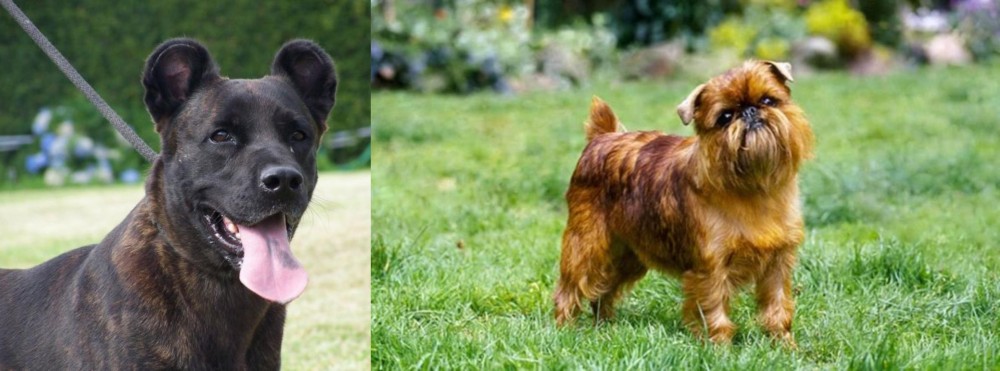 Cao Fila de Sao Miguel is originated from Portugal but Brussels Griffon is originated from Belgium. Cao Fila de Sao Miguel may grow 41 cm / 17 inches higher than Brussels Griffon. Cao Fila de Sao Miguel may weigh 35 kg / 78 pounds more than Brussels Griffon. Cao Fila de Sao Miguel may live 3 years more than Brussels Griffon. Cao Fila de Sao Miguel may have more litter size than Brussels Griffon. Cao Fila de Sao Miguel requires Low Maintenance. But Brussels Griffon requires Moderate Maintenance
Cao Fila de Sao Miguel is originated from Portugal but Brussels Griffon is originated from Belgium. Cao Fila de Sao Miguel may grow 41 cm / 17 inches higher than Brussels Griffon. Cao Fila de Sao Miguel may weigh 35 kg / 78 pounds more than Brussels Griffon. Cao Fila de Sao Miguel may live 3 years more than Brussels Griffon. Cao Fila de Sao Miguel may have more litter size than Brussels Griffon. Cao Fila de Sao Miguel requires Low Maintenance. But Brussels Griffon requires Moderate Maintenance
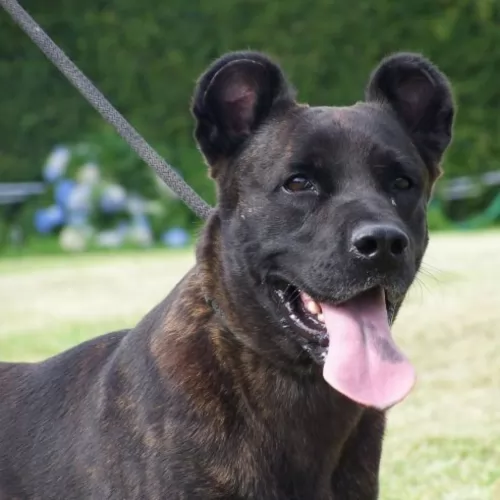 This Molosser type dog originated on Sao Miguel Island in the Azores, a region of Portugal. Known also as the Sao Miguel Cattle Dog or the Azores Cattle Dog, the existence of the Cao Fila de Sao Miguel has been documented since early in the 19th century.
This Molosser type dog originated on Sao Miguel Island in the Azores, a region of Portugal. Known also as the Sao Miguel Cattle Dog or the Azores Cattle Dog, the existence of the Cao Fila de Sao Miguel has been documented since early in the 19th century.
The dog has always been used as a cattle dog but today it remains rare outside of Portugal. In was in 1984 in Portugal that the first written breed standard was published in Portugal. The Cao Fila de Sao Miguel then earned recognition with the Portuguese Kennel Club.
 The Brussels Griffon is one of the three different types of Griffons. There is the Belgian, the Petit, and the Brussels Griffon. “Griffon” means wiry and the Brussels Griffon lives up to that moniker. The Brussels Griffon’s coat is longer than that of the Belgian Griffon and the Petit Brabanon (Griffon) has a smooth, short coat. The breed is probably originally developed by crossing Belgian street dogs with the Affenpinsher as early in the 1800’s. They were favored by the cabbies in Brussels as guard dogs. They were also bred to hunt rats. Sometime toward the end of the 19th century, the Griffon was again crossed this time with a pug. This accounts for the type of head that the Brussels Griffon has, namely a brachycephalic head. It also accounts for the smooth coat of the Petit Griffon. The modern-day Griffon may also have been crossed at some time with one or more of these breeds: the English Toy Spaniel, the Irish Terrier and the Yorkshire Terrier.
The Brussels Griffon is one of the three different types of Griffons. There is the Belgian, the Petit, and the Brussels Griffon. “Griffon” means wiry and the Brussels Griffon lives up to that moniker. The Brussels Griffon’s coat is longer than that of the Belgian Griffon and the Petit Brabanon (Griffon) has a smooth, short coat. The breed is probably originally developed by crossing Belgian street dogs with the Affenpinsher as early in the 1800’s. They were favored by the cabbies in Brussels as guard dogs. They were also bred to hunt rats. Sometime toward the end of the 19th century, the Griffon was again crossed this time with a pug. This accounts for the type of head that the Brussels Griffon has, namely a brachycephalic head. It also accounts for the smooth coat of the Petit Griffon. The modern-day Griffon may also have been crossed at some time with one or more of these breeds: the English Toy Spaniel, the Irish Terrier and the Yorkshire Terrier.
By 1880, the breed was recognized and appeared in the Brussels Exhibition of 1880. They were also found in paintings of the same era by the Flemish painter, Van Eyck. In the beginning of the 20th century, the breed was extremely popular with the nobility in Belgium. As with so many other breeds, the number of Brussels Griffon was greatly reduced during the First World War. It did not take them long however to make a comeback after the war. Their popularity then spread around the globe.
The European FCI considers the Brussels Griffon, the Belgian Griffon and the Petit Brabancon (Griffon) to be three separate breeds with no interbreeding among them. They are shown as three separate breeds in Europe, with the difference between the Belgian and Brussels being the accepted colors. The Brussels is only red in color while the Belgium Griffon can be in all other colors. In the United States the three types of Griffons are considered one breed with three varieties. Only the Brussels Griffon is recognized by the AKC. The difference in coat and color make for the different varieties in the U.S.
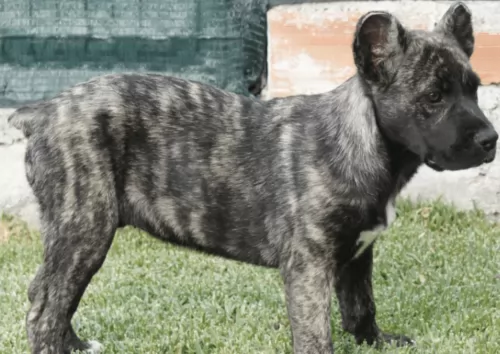 The Cao Fila de Sao Miguel is a medium to large sized dog standing 50 – 61cm in height and weighing 25 – 41kg. As with all molossers, the dog has powerful jaws.
The Cao Fila de Sao Miguel is a medium to large sized dog standing 50 – 61cm in height and weighing 25 – 41kg. As with all molossers, the dog has powerful jaws.
This dog breed has muscular limbs and dark brown eyes. The ears are normally docked into a rounded shape much like that of the Hyena. The tail has always been docked at the 2nd or 3rd vertebra but these days with regulations surrounding docking, the tail is unfortunately left long.
The coat of the Cao Fila de Sao Miguel is short and smooth while the hair on the tail and thighs is a bit longer. The Cao Fila de Sao Miguel is always brindled, and comes in shades of fawn, brown, gray or black. A white mark on the forehead around the chest or on the paws is also often seen.
The Cão de Fãila de São Miguel is a working dog who is used to guarding livestock. He is an athletic dog, game for plenty of action, and he will require plenty of daily exercise. He is territorial and makes an excellent guard dog, but even so, when it comes to his own owner and human family, he is gentle and loving.
The Cao de Fila de Sao Miguel is an intelligent dog and he will need training and socialization which allows him to get on well with children in the home as well as other pets.
 All three types of Griffons are toy size dogs with short, thick bodies and distinctive brachycephalic heads. Regardless of coat color their muzzles and whiskers are black, and they have large eyes, also black, a mustache and beard. They have black eyelashes and a nose that is very black. All this is set against their red, beige, black or black and tan coat. Their forehead is dome shaped and the muzzle is short. The breed has small ears that are high up on the dog’s head. The ears might be cropped in the United States but would not be in Europe. The lower jaw is prominent and the jaw itself is undershot. They have black toenails and pads, with strong and muscular hind legs. The Griffon has a docked, high set tail in the U.S. and a full tail in Europe and all of the United Kingdom.
All three types of Griffons are toy size dogs with short, thick bodies and distinctive brachycephalic heads. Regardless of coat color their muzzles and whiskers are black, and they have large eyes, also black, a mustache and beard. They have black eyelashes and a nose that is very black. All this is set against their red, beige, black or black and tan coat. Their forehead is dome shaped and the muzzle is short. The breed has small ears that are high up on the dog’s head. The ears might be cropped in the United States but would not be in Europe. The lower jaw is prominent and the jaw itself is undershot. They have black toenails and pads, with strong and muscular hind legs. The Griffon has a docked, high set tail in the U.S. and a full tail in Europe and all of the United Kingdom.
The rough coated types have a dense and wiry coat and the standard encourages the hardest possible wire coat. Their heads are also wiry and long around the chin, cheeks, nose and eyes. They should be hand-stripped and never left ungroomed. The coat can matt if not taken care of adequately. One of the most important features of the Brussels Griffon is its human like face or monkey like appearance.
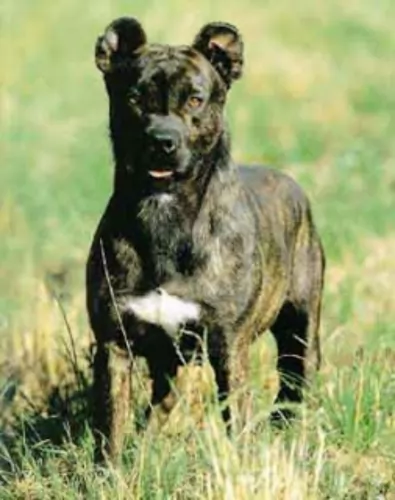 The Cão de Fila de São Miguel is a natural guard dog who will love and guard his family. With training and socialization he can become a devoted and gentle family dog with children and with other pets. They can be aloof with strangers.
The Cão de Fila de São Miguel is a natural guard dog who will love and guard his family. With training and socialization he can become a devoted and gentle family dog with children and with other pets. They can be aloof with strangers.
The Cão de Fila de São Miguel is an active dog who wants to be busy, and he is therefore better suited to country living rather that in a small home where space is limited.
Intelligent, a fast learner, protective and territorial, the Cão de Fila de Sao Miguel is an aggressive, hardy working breed who is also an excellent guard dog and protector. With firm training he becomes loyal, lovable and devoted – an ideal family companion.
 The Brussels Griffon is sociable, alert and very intelligent. She is very energetic, playful and loving. They bond deeply with their family. Housebreaking might be a challenge as it is with all toy/small breeds. They are incredibly lonely and restless when their people are not around them. They have great personalities, terrier like characteristics, and deep loyalty to their humans. They are great companions and love children. Just remember how small they are. They are susceptible to Little Dog Syndrome if the human does not establish themselves as the alpha right away.
The Brussels Griffon is sociable, alert and very intelligent. She is very energetic, playful and loving. They bond deeply with their family. Housebreaking might be a challenge as it is with all toy/small breeds. They are incredibly lonely and restless when their people are not around them. They have great personalities, terrier like characteristics, and deep loyalty to their humans. They are great companions and love children. Just remember how small they are. They are susceptible to Little Dog Syndrome if the human does not establish themselves as the alpha right away.
 The Cao Fila de Sao Miguel is a dog who enjoys exceptional health. When you do research you see there aren’t really any particular illnesses plaguing this dog, and he can actually live to be 15 years of age. Be aware of some illnesses as they are common among different dog breeds – hip- and elbow dysplasia, bloat, eye diseases such as progressive retinal atrophy and cataracts, heat intolerance and arthritis.
The Cao Fila de Sao Miguel is a dog who enjoys exceptional health. When you do research you see there aren’t really any particular illnesses plaguing this dog, and he can actually live to be 15 years of age. Be aware of some illnesses as they are common among different dog breeds – hip- and elbow dysplasia, bloat, eye diseases such as progressive retinal atrophy and cataracts, heat intolerance and arthritis.
This is a dangerous illness that can affect any dog – small or large. This is when the dog’s stomach fills with fluid or gas so that it expands. The stomach then puts pressure on other organs and your dog can have trouble breathing. There is also no blood flow to the heart. Sometimes the stomach of the dog twists and your pet can go into a state of shock. Recognize the symptoms of bloat – a swollen stomach, drooling and wanting to vomit but nothing coming up. Get your dog to the vet immediately.
An abscess can be so painful for your pet often when your dog has a thick coat it could go undetected. If an abscess on your pet doesn’t burst, or even if another abscess appears, a vet must be consulted and a course of antibiotics given.
Ear mites, dirt and a build up of wax may cause your dog to scratch at the ear, shake his head or hold it on one side. There may even be a foul-smelling discharge. Your dog will need to have his ears cleaned. Special ear drops can rectify the problem. Remember that hot, red ears will require veterinary attention.
 The Brussels Griffon is susceptible to many of the diseases and genetic conditions that many other toy or small dogs have. Flat-faced breeds like the Griffon also suffer from difficulty with breathing under certain weather conditions and they are known to snore. They should not be kept in hot, sunny, humid climates for this reason. They may also display patella luxation (slipping kneecaps) and hip dysplasia. Lastly, they are susceptible to ear infections. Dams are often in need of cesarean sections to deliver their litters. They have very serious health issues due to the head shape and flat face. These might include eye and respiratory issues and syringomyelia – a deadly neurological disease. They are susceptible to epilepsy, dental issues and eye lash issues.
The Brussels Griffon is susceptible to many of the diseases and genetic conditions that many other toy or small dogs have. Flat-faced breeds like the Griffon also suffer from difficulty with breathing under certain weather conditions and they are known to snore. They should not be kept in hot, sunny, humid climates for this reason. They may also display patella luxation (slipping kneecaps) and hip dysplasia. Lastly, they are susceptible to ear infections. Dams are often in need of cesarean sections to deliver their litters. They have very serious health issues due to the head shape and flat face. These might include eye and respiratory issues and syringomyelia – a deadly neurological disease. They are susceptible to epilepsy, dental issues and eye lash issues.
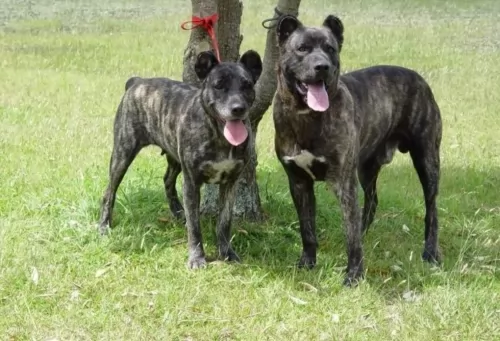 The Cao Fila de Sao Miguel is a low maintenance breed and all that will be required for him is that you give him a thorough brushing a couple of times a week.
The Cao Fila de Sao Miguel is a low maintenance breed and all that will be required for him is that you give him a thorough brushing a couple of times a week.
The Cao Fila De Sao Miguel puppy will require four meals of puppy food a day. The adult Cao fila de sao miguel can go down to 1 or 2 meals a day after his 1st birthday.
These days you get some excellent commercially manufactured dog foods and your veterinarian can help you choose one suited to this particular dog breed. Add in some home-made vegetables, rice and meat every now and then. The idea is to make sure your dog is getting in all the minerals and vitamins he needs.
There is evidence showing that dogs who enjoy raw meat every now and then enjoy a number of health benefits. Skin and teeth are improved, your dog has a shinier coat, less allergies,less inflammation and he is more relaxed and amicable. Ensure a constant supply of fresh, cool water in a clean bowl and at all times.
 The Brussels Griffon can choke easily so take care with the size of kibble you feed them. They need about one fourth to one half of a cup of high quality dry food that is designed for small or toy dogs. Divide this amount into two or three small meals per day. Puppies should be fed more often than adults but never feed just one large meal per day. Be careful that your Brussels Griffon does not become obese.
The Brussels Griffon can choke easily so take care with the size of kibble you feed them. They need about one fourth to one half of a cup of high quality dry food that is designed for small or toy dogs. Divide this amount into two or three small meals per day. Puppies should be fed more often than adults but never feed just one large meal per day. Be careful that your Brussels Griffon does not become obese.
The Brussels Griffon, regardless of type has some very serious health issues due to the shape of their heads.
Brachycephalic Syndrome – This can cause all the respiratory issues as well as eye issues such as cataracts and corneal ulcers.
This is a very playful and energetic breed that needs at least some exercise every day. They love to play with their family. They are smart and easy to train. They love agility, obedience, barn hunt and tracking activities. You can just as effectively play with and exercise your Brussels inside as well as out.